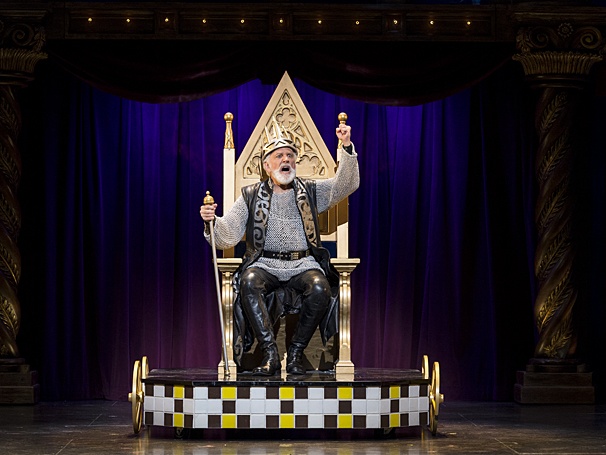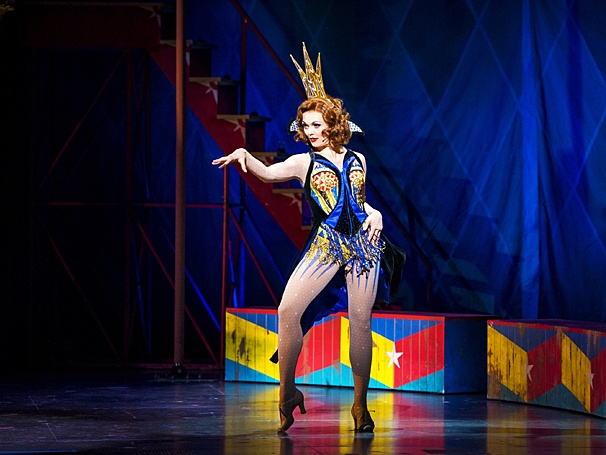Advertisement
With A Few Missteps, A Revived ‘Pippin’ Finds Its Groove
It's fair to mention that “Pippin” is not my favorite musical. I also happened to be sick as a dog as I sat in the audience at the Boston Opera House on opening night. But, that said, I enjoyed this production so much more than I did the American Repertory Theater's pre-Broadway update of the 1972 Tony Award-winning musical onstage in Cambridge. That adaptation did go on to Broadway and went on to win another four Tony Awards in 2013, including one for best musical revival. And indeed it is revived!
The show — which artistic director Diane Paulus pumped up with acrobatics and magic tricks executed by Montreal-based circus troupe Les 7 doigts de la main -- seems to have found its groove. Literally. Original 1972 production director Bob Fosse’s signature choreography — proto-pop and lock punctuated with a few groovy go-go moves — and Stephen Schwartz’s indelible score, where every song tells a story and sounds different from every other, is well served. In fact, this cast made me warm to its themes and helped smooth over the shift to that indisputably odd and downcast second act.

The eponymous Pippin is heir apparent to King Charlemagne (a confident, Monty Pythonesquely funny John Rubinstein who played Pippin in the original Broadway production with Ben Vereen). Here, Pippin is played by Brian Flores with boyish charm and energy, a strong pop voice and a winning mix of innocence and smarts. He flees the stifling court intrigue (his mom likes his younger brother Lewis better) and sets out into the world seeking a fulfilling, meaningful life.
Like an inverse Hamlet, this boy can act and he tries it all -- war, sex, political revolution, art and religion — until finally in Act 2, a widow and her son present the possibility of the ordinary domestic life. By that time, Pippin is in despair and can't believe that's all there is.
But let me go back. Act 1 is truly alive with spectacle and led by an emcee or ringmaster of sorts called the Leading Player who — along with her troupe of acrobats and magicians — eggs Pippin on, enticing him with the world's delights, which may not be all that they seem. Gabrielle McClinton in the part has a mischievous almost devious glint in her eye; she sings and dances well enough, though not charismatically enough to mesmerize us. The dancers (choreographed by Chet Walker in the style of Fosse) are often out of step and fail to consistently achieve Fosse's trademark line and mechanized precision.
Pippin's mother Fastrada, on the other hand, is the sleekly delectable Sabrina Harper who snaps her every move into sensual shape. And Adrienne Barbeau as Pippin's Grandmother Berthe? Well, let me just say that the actress is a marvel. Her performance grounds this production in a warmth and earthiness that helps us with the cruel realities of Act 2. And when she takes to the trapeze with a body that just hasn't quit? Well, I was cheering in my soul. You go, girl. The audience went wild.

And speaking of Act 2, this is where reality sets in. Really. There's a scene with barnyard animals that I believe has been amplified and certainly appealed to the kids in the audience, but lengthens an act which is already too long. The widow Catherine, played by a frisky Bradley Benjamin, doesn't seem too old at all for our young hero, though the Leading Player keeps undermining her age-appropriateness throughout. The final scene where Pippin realizes perfection is not of this world but, unlike Icarus finds out before his wings melt, remains a real downer.
"Pippin's" musical and literary pedigree can’t hold a candle to “Candide,” which covers much of the same thematic territory. Where “Candide” (Bernstein and Voltaire by way of Hugh Wheeler) is life-affirming and transcendent, “Pippin” (Schwartz and Hirson) is depressing and cruel. When Catherine sings "I Guess I'll Miss the Man," I couldn't help but think of Sondheim's "Being Alive" from the musical “Company” and how much wiser and more satisfying it is in expressing not only the same sentiments about the compromises we make, but also the fulfillment that comes with embracing our lives the way they are.
Broadway in Boston is staging “Pippin” at the Boston Opera House through Feb. 14.
Joyce Kulhawik is an Emmy Award-winning journalist, president of the Boston Theater Critics Association and member of The Boston Society of Film Critics. You can read her reviews online at JoycesChoices.com.
